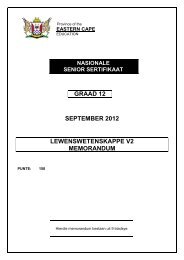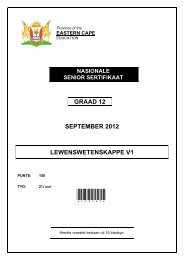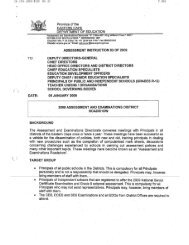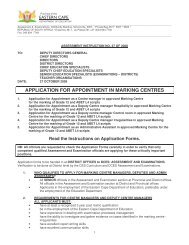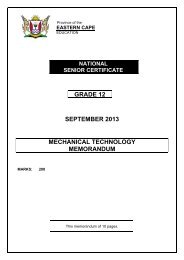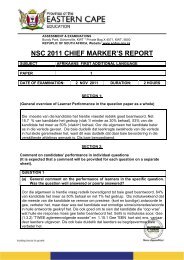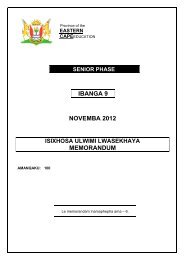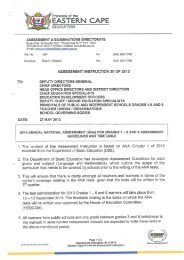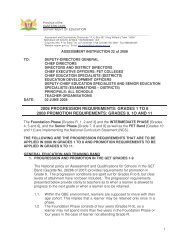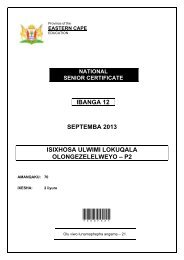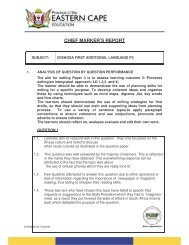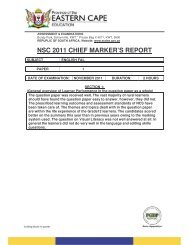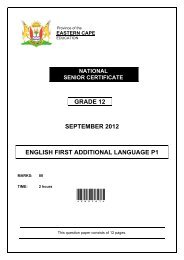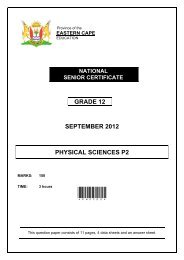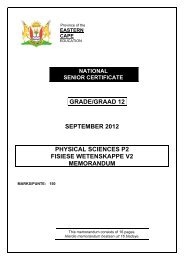GRADE 9 NOVEMBER 2012 SOCIAL SCIENCES ... - Ecexams.co.za
GRADE 9 NOVEMBER 2012 SOCIAL SCIENCES ... - Ecexams.co.za
GRADE 9 NOVEMBER 2012 SOCIAL SCIENCES ... - Ecexams.co.za
Create successful ePaper yourself
Turn your PDF publications into a flip-book with our unique Google optimized e-Paper software.
6 <strong>SOCIAL</strong> <strong>SCIENCES</strong> (Memo) (<strong>NOVEMBER</strong> <strong>2012</strong>)SECTION B:QUESTION 5HISTORYAPARTHEID IN SOUTH AFRICA5.1 When the war ended in 1945: Many black people moved to the cities to find work as skilled labourers;black people began to <strong>co</strong>mpete with their white <strong>co</strong>unterparts foremployment. Strikes which also took place threatened the government as there weremany black trade unions. Housing and food shortages for whites led to blame shifting and whitepeople looked to the government to place restrictions on where blackpeople should live and work, thus voted the National Party to power in1948.√√ 2 (Any 2 above/relevant facts) (2)5.2 5.2.1 Population Registration Act √ 1 (1)5.2.2 Group Areas Act √ 1 (1)5.2.3 Bantu Education Act √ 1 (1)5.3 He was a member of the African National Congress Youth League (ANCYL)in 1948. In 1949 Sobukwe was elected as president of the Fort HareStudents' Representative Council, where he proved himself to be a goodorator.In 1950 Sobukwe was appointed as a teacher at a high school inStanderton, a position he lost when he spoke out in favour of the DefianceCampaign in 1952. In 1952 Sobukwe achieved notoriety backing theDefiance Campaign.He identified with the Africanists within the African National Congress and in1957 left the ANC to be<strong>co</strong>me Editor of The Africanist newspaper inJohannesburg. He was a strong believer in an Africanist future for SouthAfrica and rejected any model suggesting working with anyone other thanblacks.He left the ANC and formed the Pan Africanist Congress (PAC), where hewas elected its first President in 1959. Robert Sobukwe became known asthe Professor or 'Prof' to his close <strong>co</strong>mpatriots due to his educationalachievements and powers of speech.He spoke of the need for black South Africans to "liberate themselves"without the help of non-blacks. He also inspired many organi<strong>za</strong>tions involvedin the anti-apartheid movement, notably the Black ConsciousnessMovement of Steve Biko.In 1954 after moving to Johannesburg Sobukwe became a lecturer ofAfrican Studies at the University of the Witwatersrand. Sobukwe led a marchwith his newly formed party PAC on 21 March 1960.
(<strong>NOVEMBER</strong> <strong>2012</strong>) <strong>SOCIAL</strong> <strong>SCIENCES</strong> (Memo) 7This was a nationwide protest against the hated Pass Law which requireblack people to carry a pass book at all times. In a similar protest the sameday in Sharpeville, police opened fire on a crowd of PAC supporters, killing69 in the Sharpeville Massacre.Sobukwe was arrested; he was charged and <strong>co</strong>nvicted of incitement, andsentenced to three years in prison and interned on Robben Island. Underthe "Sobukwe clause" and went on for a further three years. Sobukwe wasthe only person imprisoned under this clause.Sobukwe was kept in solitary <strong>co</strong>nfinement but permitted certain privilegesincluding books, newspapers, civilian clothes, bread etc. He lived in aseparate area on the Island where he had no <strong>co</strong>ntact with other prisoners.The only <strong>co</strong>ntacts were his secret hand signals whilst outside for exercise.He studied during this time and received (among others) a degree ine<strong>co</strong>nomics from the University of London.It is speculated that the SouthAfrican administration had profiled Robert Sobukwe as a more radical anddifficult opponent than the regular ANC prisoners. Sobukwe was released in1969. He was allowed to live in Kimberley with his family He was alsorestricted through a banning order, which disallowed political activities.Various restrictions barred Sobukwe from traveling overseas, thus curtailinghis attempts at furthering his education. For this same reason he had to turndown several positions as a teacher at various locations in the UnitedStates. Robert Sobukwe finished his law degree with the help of a locallawyer, in Galeshewe. On <strong>co</strong>mpletion he then started his own practice in1975 in Kimberley. He died on 27 February 1978, and was buried in Graaff-Reinet on 11 March 1978.√√√√√ 5 (Any 5 facts above/relevant facts) (5)[10]QUESTION 6 HUMAN RIGHTS ISSUES DURING AND AFTER WORLD WAR 26.1 Harsh terms of the Treaty of Versailles. Germany stripped of her overseas empires, Alsace and Lorraine, theSaar & Rhinelands. Germany had to disband her forces and reduce her army to half of thesize of the Allies. Germany was charged with war indemnity, accept the War Guilt Clause. The Weimar Republic which was weak, though elected by proportionalrepresentation (democratic). Dislike the fact that the Weimar Republic accepted the terms of theTreaty of Versailles. E<strong>co</strong>nomic problems which led to joblessness and inflation and inability to<strong>co</strong>pe as a result of the Great Depression. √√ (1+1= 2) (Any 2 above) (2)6.2 They promised to strengthen the armed forces They preached nationalism, being proud of being German They promised to create jobs. They promised to undo all the unpopular terms of the Treaty ofVersailles. They promised Germans living space. They promised Germans to remove those whom they disliked (Jews –scapegoats).√√ (1+1= 2) (Any 2 above) (2)



